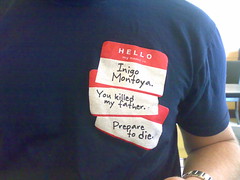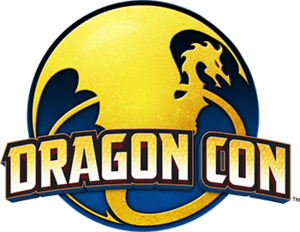The personal blog of Jay Garmon: professional geek, Web entrepreneur, and occasional science fiction writer.
Monday, June 25, 2012
Dragon*Con 2011: A n00b's Tale, Part V
MONDAY
My last day of Dragon*Con 2011 started with what had become a routine. Bubba Chuck had warned me that by the end of D*C I'd have become a "pro," someone whose job it was to Do Geek full-time everyday. He was so very right.
I quietly grabbed my shower without waking my roommates, mingled with the early risers/late closers in the Marriott elevators, strolled quietly across the skybridge to the Peachtree Center food court to grab a Dairy Queen sausage biscuit, then scampered back through a trio of hotels and a drizzle-specked Atlanta concrete until I reached the lobby of the Sheraton. There I joined a line that was already wound through the entire upper lobby level of the hotel and, minutes after I arrived, filled the complete lobby and burst out onto the sidewalk.
Wil Wheaton was coming to Dragon*Con -- for the first and perhaps only time.
Thursday, July 01, 2010
Nerd Word of the Week: Unicorn Pegasus Kitten
The unicorn pegasus kitten, sometimes referred to as the UPK, was created as a parody of conflated internet memes by artist Jeff Zugale at the request of author-blogger John Scalzi (depicted as an orc in the original UPK painting) and actor-author-blogger Wil Wheaton (depicted as a clown-sweatered orc-hunter in the original UPK painting) as part of a fundraising project to benefit the Lupus Alliance of America. The unicorn pegasus kitten instantly became a meme unto itself, with sci-fi songwriter John Anealio already providing its immortal ballad.
I bring it up because: As of today, the co-inspirator of the unicorn pegasus kitten is President of the Science Fiction and Fantasy Writers of America. Already his campaign platform has given way to a reign of terror. And unlike in the painting, there is no clown-sweatered spear-toting meme-rider to save us. Hooray!
Related articles by Zemanta
- unicorn pegasus kitten. scalzorc. clown sweater. fanfic. AWESOME. (wilwheaton.typepad.com)
- Here's the Picture, You Supply the Thousand Words (wired.com)
- Revealing the Unicorn Pegasus Kitten + Sunday/Monday Recap (whatever.scalzi.com)

Wednesday, September 16, 2009
Goodbye Written Weird, hello Jay Garmon dot Net
 Image by 1541 via Flickr
Image by 1541 via FlickrRather serendipitously, JayGarmon.net finally came through this morning. As such, the Written Weird is no more -- or won't be by this weekend, when the DNS propagation is complete. (For the record, JayGarmon.com is owned by a State Farm agent in Russell Springs, KY -- no relation -- and I don't expect I'll ever get that URL.) Going forward, this site will be known as Jay Garmon [dot] Net. Yes, I totally cribbed the title styling from Wil Wheaton. The change is largely cosmetic, intended mostly for SEO and branding purposes. Blogger will auto-redirect all the old link equity, and since Google owns Blogger, I'm told that little to any PageRank damage will be incurred. We'll see.
In any case, the content of this site will remain the same. Moreover, the fact that my URL came through just before I relaunched my personal trivia column is a tasty piece of happy. With any luck, I'll have the new DNS situation squared before I appear on TechTalk radio this weekend. Sometimes, things just go right.
Monday, January 26, 2009
Why are sci-fi conventions dying? It's not just the economy, stupid
 Image via Wikipedia
Image via Wikipedia
I wrote about this myself a while back, and as a guy who has helped run convention, my general take is that...
A) The economy is enemy #1 right now and since most cons barely make it in good times lean times will see some culling of the herd.
B) The Internet is hurting "traditional" conventions because these cons are holding onto activities that were vital in the 1970s or earlier but that the Web has made unnecessary.
For example, how many cons still have movie rooms? These were awesome back before VCRs and the only way you could see stuff no longer in the theaters--or even obscure when home movies first came out--was at conventions. How many cons still have LAN parties, when with the exception of casemodders there is no reason to pay to network game when you can do all that online from home today. And so far as dealer's rooms? Name me one item you can get here that you can't get cheaper online?
I'll even take it one step further and ask why do we need masquerade skits when we have Youtube humor videos? Why do we need filking when we've got Jonathan Coulton, MC Frontalot and Paul & Storm--all with stuff free online? Why do I need single-author panels when I'll get less out of that one hour with person than I can get with that author's blog.
These are all legacies of a bygone convention era, and most cons waste their energies catering to the dying throngs of fandom that NEVER WANT CONS TO CHANGE. Yes, the old guard are your most reliable customers, but it's a shrinking market and focusing on them means you won't grow new customers fast enough to replace them.
The conventions that succeed today are the ones that offer me experiences I can't replicate from my PC or in the regular course of my life. Some of that is primacy--SDCC let's me see clips and hear announcements first. Origins and GenCon do the same with game debuts and playtests. Other cons simply offer scale--if you like costuming, enjoy the DragonCon parade, it's HUGE. Smaller cons win by specializing. PenguinCon, for example, combines sci-fi and Linux enthusiasts, with a decide sci-tech bent. That crossover appeal is key here.
Cons can offer experiences I can't get from my PC. First of all, multi-author panels are awesome, because the interplay between multiple experts and celebrities is an experience that can't be matched through blogs and online interviews. Genuine, in-person tabletop games with experienced game masters offer an untouchable con experience--I get to try new stuff with people who really know how the games work and are excited about them. (Personally, I'd love to see a convention that combined the above to experiences--a celebrity gaming con that let me play D&D with Wil Wheaton or Scott Kurtz.)
Stop selling me miniature wargaming models or boffer nerf swords and run workshops that show me how to paint minis are build boffer blades. Don't show me your fan film, let's make one over the course of the con. Don't just show me anything, interact with me. That's the only way conventions will survive.Tuesday, November 18, 2008
Building the perfect Web 2.0 sci-fi short fiction magazine
 Image via Wikipedia
Image via Wikipedia
This, of course, got me thinking about how to save short-form science fiction as a print medium.
The Big Three--Analog, Asimov's, and the Magazine of Fantasy & Science Fiction (F&SF)--have a collective circulation of less than 50,000 readers. The subscriber list for my Geek Trivia e-newsletter is 20 percent bigger than that, which is to say 50K is a dangerously low readership number if you're going to shell out the money required to put your fiction onto bundles of dead trees and physically ship them to people. If my sorry ass is outperforming you, then you're in trouble.
Now, the point of the MediaShift article isn't the usual "they didn't adapt to the Internet" screed, as the Big Three have been steadily bleeding readers for 20 years--before online competition was a real issue. The point is that these are iconic magazines that are dying because they refuse to adapt. They aren't, as Warren Ellis puts it, "designed to be wanted." They're stuck in a 1950s mindset, and it's killing them. That's the first strike.
The second strike is that SF magazines don't pay writers enough to be worth writing for--largely because of high overhead. Which is why so many online fiction venues have popped up, some free-to-read, some not. Heck, even Amazon has gotten into direct short fiction sales, acting almost as a publisher rather than a retailer. The Internet is putting pressure on the Big Three's business model thanks to lower overhead. But these online venues certainly haven't taken the world--even the sci-fi Internet world--by storm.
Which brings me to Cherie Priest. This morning, Wil Wheaton pimped one of Ms. Priest's latest short stories, "Tanglefoot," in his blog. The story is published in Subterranean Magazine online, so it's free for anybody to read, anytime. As soon as I read the two-paragraph pitch about a magical steampunk alt-history of the U.S. Civil War, I not only wanted to read it, but to share it with my fellow Cherie Priest-loving friends, most of whom don't and/or won't read fiction online. So, since I cyber-stalk Ms. Priest (amongst a host of other geek luminaries), I reached out to her via Twitter and I asked where I could snag a print edition of the story for my friends. Her response was quick and apologetic:
"Thanks, dude - but I'm afraid ... well ... you can't. It's a Subterranean exclusive. Next year, 2 books in this world, though."
"Tanglefoot," you see, is an online loss leader for some yet-to-be-published works from Cherie Priest. Even though I can order a print copy of Subterranean magazine, I can't order one with this story in it.
Which is where my idea comes from, courtesy of an old idea I called Ransom TV.
Start an online genre magazine that commissions writers to write stories, and then lets fans pay for the commission. Think of it as a reverse Radiohead album release. In this case, Cherie Priest writes the pitch for the short story, which is listed as a commissionable project. There is a price listed for the commission, and fans are given a Paypal account into which they can donate to get the story written--as much or as little as they want to pay. The faster the commission is met, the faster the story is published. Under this system, writers can earn a decent word-rate for short fiction, because the writers set they word-rate. We also harness a little wisdom of crowds on the selection side, turning the audience into the editor.
Once the story is paid for and published, it's free to be read. Period. No restrictions. If you're a cheapskate (like me) you can just hang out and wait for someone else to pay the freight. If you're a total fanboy (like me) and would pay good money to see a great pitch from a favorite writer fulfilled, you'll donate a fair amount to speed the cause. Moreover, if the site gives you badges, banners and buttons that let you promote the story commission on your site (and does the same for the authors), and combines that with some "ask your friends to donate" e-mail/Facebook/Twitter interfaces, every fan becomes a promoter.
As John Scalzi reminds us, writers shouldn't write for free, but readers generally shouldn't be required to pay online. That said, 37 Signals suggests that paid is the new free, because ad-supported models aren't generally workable except on huge economies of scale. Under this system, you get both. The fanboys pay for the content that the casual readers consume for free. Zealots pay for the lurkers. It totally complies with the 90-9-1 rule.
But that, my friends, is only half the battle. The other half is the custom magazine. I don't want to limit my readership to just the techno-savvy. I need to be print-accessible. The easy part there is making every story a downloadable PDF.
But what if I want something nicer than a desktop printout? What if I want an issue of Subterranean with "Tanglefoot" in it?
Well, I'd combine our PDF system with a print-on-demand service like Lulu, and design a magazine-assembly system that let you "shop" for stories in the catalogue and design a custom anthology that you could have printed. My contracts with the writers would pay them direct royalties for any physical copies printed, so they make money on the back end. (I'd also give them badges that let them promote their printable versions.)
Now my readers can build a just-for-them one-off magazine from my catalogue, have it printed and shipped anywhere. There would be a nominal charge, but we're used to paying for phsycial goods. And if we're feeling really crazy, we could even do a quarterly "most popular" or "editor's choice" magazine, print a modest run ourselves, and actually distribute it to book stores and newstands. Sounds nutty, but I think there might be an audience there.
Anybody else think this could work?
Thursday, November 06, 2008
Sci-fi convention 2.0
 Image via Wikipedia
Image via Wikipedia
Bullshit.
Yes, the Internet has made one of the primary reasons to attend cons disappear--once upon a time, the only way to connect to fellow fans and creators was in person at cons, but now you've got more geek friends in you World of Warcraft guild than you ever met at Mid-South or APolloCon. Except that chatting online and actually hanging out with people are still two very different experiences. And despite our reputations as introverted, girl-fearing basement trolls, geeks are social creatures, too, and crave real-life human contact. Mostly.
The problem with fandom in the Internet age is that most conventions refuse to adapt to Web 2.0. They work against the Internet, rather than with it. For example, I can conjure up a list of dream convention Guests of Honor--something I've done before-- strictly from my Twitter follow list. Social media makes reaching these people easier, not just because I can ping them in Twitter easier than I can penetrate their spam filters, but because by following them, I know how to approach them--what their interests are, what their preferences in terms of con attendance are, and a sense of their availability. Plus, I can appeal to their vanity by namedropping any of the recent projects they've pimped on Twitter. That's so much better than a blind e-mail.
And that's just one social media tool, making no mention of Facebook, Pownce, MySpace, or any other buzzword-compliant online community.
If I were to get any decent number of the people I tweet-stalk to attend my convention, they'd all Twitter and/or blog about it whilst attending, instantly creating a digital megaphone of free publicity for my con, which parlays into the next year's attendance and a desire for other guests either to officially attend or just hang out of their own accord. (This is especially true of the non-television and film folks, who tend to make more use of conventions as chances to promote their work.)
Since I know the Profilactic guys (name-dropping!), I could probably arrange for a credential-neutral signup system that let participants in any online community connect. More to the point, I'd invite the Profilactic team, along with geek-centric Web 2.0 people like Jake McKee (he's got serious Lego street cred). If PenguinCon can combine sci-fi and Linux, why can't my local ConGlomeration combine sci-fi and Web 2.0? Why not let the artists and the engineers comingle, to everyone's entertainment and benefit?
Cost is the general answer, of course. The Convention Committee pays for airfare, room, and a meal per diem to guests, and in the case of those that require it, an appearance fee and/or accomodations for the guest's family. Thus, most cons can only afford two or three guests, so attaining critical mass of several really cool guests means many of the celebs must pay to bring themselves, which means the con needs to be big enough for it to be worth their while to attend as a promotional expense, which is a chicken-and-the-egg problem.
Except I seem to recall that physical attendance is no longer a barrier to participation in the Web 2.0 age. Yes, I know this contradicts the "actually hang out with people" angle of my earlier statement, but what if you could do big-screen multiparty video-conferencing at our Convention 2.0, with panel sessions involving a mix of live and online attendees, Jedi Council-style? Maybe I can't afford to bring Charles Stross to the states, but if I can get him on a panel discussing space opera sci-fi with, say, John Scalzi physically in the room, that's worth signing up for, right? Or maybe having Internet-friends (with each other, not with me) Warren Ellis and Wil Wheaton discuss music and comics and blogging, with only Wil in the room? Who wouldn't want to get in on that? And if we made the conference virtually accessible, so you could buy a cheap online pass to the virtual sessions, wouldn't folks buy a few of those. We could also archive the recorded panels for free distiribution after the con is over, pimping out the coolness as a viral advert for next year's party.
This is just me spitballing, of course. The video conference expense and tech resources may end up costing as much as a couple of guests, but if those resources got us ten big-name panelists instead of two, and those panelists had an online presence that pimped us to the masses for free, isn't that a net gain? Besides, I'd love to finally meet the guys from SFSignal, or put a voice to Rich Lovatt after conversing with him on and off for a while now.
But most of all, as a guy who loves to read literature about the future, it would be nice if my fandom finally starting embrcing the futuristic tech of the present. If sci-fi conventions want a future, they're going to have to.
Wednesday, June 11, 2008
Wil Wheaton just saved my life
 Image via Wikipedia
Image via WikipediaThe side gig has been kickin' my lazy ass of late and the day job is rounding into bizarro mutant form with actual processes and duties and a business model that relies on me pumping out Web video show scripts at a mind-numbing rate (seriously, I'm looking for willing supplicants to do similar work on the cheap; ping for details). The mangy scrap of putrid fucktard fiction I vomited all over my writers group last week was such a waste of fucking time that I was seriously contemplating shelving my lets-be-us-a-fictional-type-author aspiration for, say, a decade.
And then Elizabeth Bear, who is not only published and a mondo mega blogger but also sports stamps of approval from both Ensign Crusher and His Lord John the Scalzi goes and reminds me that, yes, it's supposed to be hard--dispshit--and that it's the hard that makes it worthy, so on and so forth. But she invokes the platitudes so well, you see. And she makes these points, that well and truly have convinced me not to go gently into that cliched, self-pitying night:
I read something somewhere that opined that the difference between garage bands and bands that break out is not musical competence, but having found their own sound. I've listened to this happen to a couple of friends' bands, and it's true, I think.See what she did there? She made this all my fault--which I already knew--but she also made overcoming it seem so very damn possible. And lo, cynical pragmatist that I am, I live for the possible. So here I be, resolving to stop second-guessing and just carve out some precious time to write my fucking fictional ass off for a change. All because I cyber-stalk Wil Wheaton's tweets and the magnificent bastard goes and lives up to his Nicest Mothefucker On Teh Internets rep.
It also applies to writers. You get stuck at that stage because you are trying to find the things that will lift you our of competence and into the next stage. And I can tell you what those things are.
One is confidence (hard, in a business where one faces constant rejection.) Confidence in the story you're telling. Confidence in your ability to tell it. That confidence is what gives a narrative drive, allows you to stop hemming and hawing and say what you mean rather than talking around it.
Another is voice. Sounding like yourself, the rhythm and swing of your rhetoric, the unique chord progressions that make this identifiably your song and not something anybody could have written.
And the interesting thing there is that that personalization--which is what's going to make people love your work--is the same thing that's going to make some people hate it. Strong opinions are what you're after. And some of those strong opinions are going to be negative.
And there's experience and technique and craft, of course, but those are all part of the competence. And mere competence isn't enough. You have to have that something extra.
Yeah, that's science fiction for ya.


![Reblog this post [with Zemanta]](http://img.zemanta.com/reblog_e.png?x-id=fdb7a59a-0ae1-4d9b-8c0f-d04b811aa421)
![Reblog this post [with Zemanta]](http://img.zemanta.com/reblog_e.png?x-id=15459b97-810b-4c8b-af44-7c37f4314ace)
![Reblog this post [with Zemanta]](http://img.zemanta.com/reblog_e.png?x-id=06082c0d-8604-43de-8fa2-13439b9a7f32)
![Reblog this post [with Zemanta]](http://img.zemanta.com/reblog_e.png?x-id=971f45a2-554c-479b-a700-c115ba998cb4)
![Reblog this post [with Zemanta]](http://img.zemanta.com/reblog_b.png?x-id=464b0bb9-9731-4d6c-8897-a1beb81f7814)